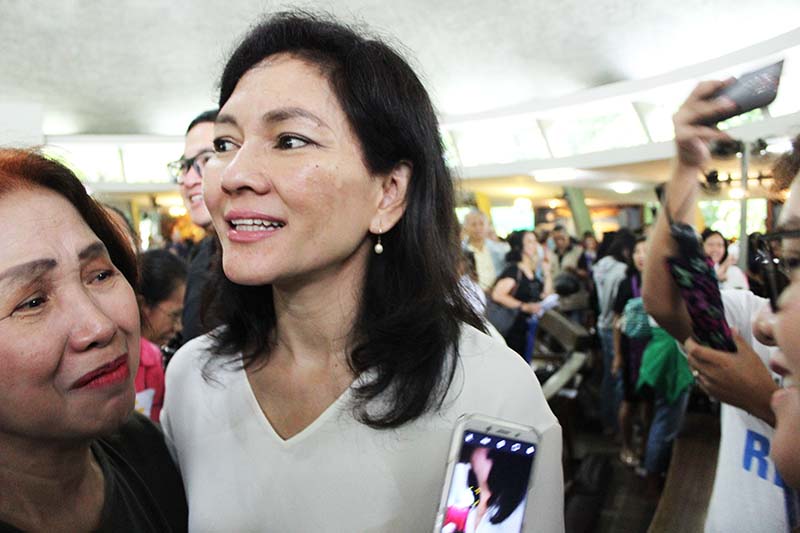5 questions that need to be answered about the Mental Health Law

MANILA, Philippines — Chelsea Salgado was just 15 when she was diagnosed with depression and anxiety disorders.
Salgado, who later on found out she also has rheumatic heart fever and polycystic ovarian syndrome, said it felt strange to take medication just to level her emotions with what a normal person usually feels. The discovery of her mental health condition, felt like “another boulder” on her shoulders, she added.
“Every part of my body was just another problem to me, even my brain. There (were) days when I (felt) like I (was getting) better, then I would get dark (and) terrifying thoughts. I (thought I have) no way out of this,” the 19-year-old multimedia arts student from De La Salle-College of St. Benilde said.
What makes having mental health issues more difficult is the attitude of people who expect her to behave normally even if there are things she cannot control.
"You don't really know who you are as a person because of it. Am I shy or is it the social anxiety? Am I lazy or is it the depression? Am I indecisive of my mood or is it (my bipolar disorder)?"
Salgado is one of the two to three million Filipinos who need mental health services and who are expected to benefit from the Mental Health Law. The landmark measure, which was signed by President Rodrigo Duterte last June 20, will integrate mental health into the country’s educational and health care system.
The passage of the law, which was first proposed 17 years ago, has been hailed as a victory for Filipinos who are suffering because of the stigma attached with mental disorders and advocates who are decrying the lack of attention and resources given to the problem.
But some stakeholders are concerned that lack of personnel, lack of involvement of the private and civil society, budget constraints and differing priorities could hinder the full implementation of the law.
1. Will there be warm bodies?
Psychiatrist Dinah Nadera, president of non-governmental organization Foundation AWIT, said the availability of qualified personnel who would provide mental health services poses a challenge. While the law mandates institutions to provide mental health services, the burden of meeting the demand would fall on professional organizations, she added.
“That’s quite challenging since it would also mean that they (mental health personnel) have to really improve on their roles. It must be clear, the personnel should be many and the government must be able to pay them,” Nadera said in a phone interview.
"We'll have psycho-social services inside universities. Would there be warm bodies available? If they are available and willing, are (the educational institutions) ready to pay them? And then professional regulations would review them… it's still a different matter," she added.
Nadera said accessibility of services is affected by the “limited capacity” of general practitioners providing mental health service
“As much as (the law) want to provide the service, the current system does not allow it or doesn't provide the opportunity yet,” she said.
“(The law) says we need to develop mental health services in primary care so you won't wait for a specialist if you can be checked by a general practitioner trained on mental health… People are falling in line and fighting over (slots) because a general practitioner’s capacity is limited in giving mental health care.”
Elizabeth Roces, dean of the college of education, liberal arts and science at Centro Escolar University in Malolos, said the government should allot enough funds to specialists and mental health personnel. She said implementers of the law should give attention to training and academic background of specialists.
"(There must be) proper evaluation of the services and the personnel who will handle the cases. From these observations, (the government should) collaborate with several organizations such as Philippine Guidance and Counseling Association (and) Psychological Association of the Philippines... these professionals are well trained to handle specific cases," Roces added.
Renz Argao, an adviser for the Youth for Mental Health Coalition (YFMHC), said there should be more guidance counselors and psychologists in schools, communities, and work places.
“I hope there can be more plantilla positions in the government for these mental health professions so we can deliver affordable services to the public. Likewise, there are also a lot of non-government organizations working to provide services and support to those who have (mental health) issues,” he said.
Gia Sison, another adviser for YFMHC, said the government should make sure that the mental health professionals would have enough training. She said there should be training caravans in far-flung areas to ensure that more people would benefit from the law.
2. Will there be enough funds?
Raymond John Naguit, national chairman of YFMHC, expressed concern on the availability of funds for mental health services.
Under the law, the amount needed for its initial implementation will be charged against the 2018 budget of the Department of Health. The items to be funded are maintenance and other operating expenses of the national mental health program, capital outlays for the development of psychiatric facilities among selected government hospitals and formulation of the strategic plan for mental health. For the succeeding years, the amount for mental health in the DOH budget and in the budget of other agencies with mandates stated in the law will be based on a strategic plan to be crafted by the Philippine Council for Mental Health.
“The effectiveness, of course, will be affected by the inadequacy of funding since there's a big lag in terms of infrastructure and health human resource. Initial funds might not be enough to cover it,” Naguit said.
A 2007 report by the DOH and the World Health Organization said only five percent of health care expenditures by the government are directed towards mental health. About 95 percent of the allocation goes to the operation, maintenance and salary of personnel of mental hospitals.
Officials previously said the Philippines only has one psychiatrist per 250,000 people in the country, far from the standard ratio of one per 50,000 people.
Naguit said the sufficiency of mental health professionals would depend on the availability of budget.
"Most of the (mental health personnel) of course would go to places where there is funding and the pay is high... I wish the barangay health workers and even the frontline health workers in the community would cater to those who have mental health needs," he said.
Sen. Risa Hontiveros, author and principal sponsor of the measure, said Congress should make sure that the implementing rules and regulations (IRR) would provide enough funds for the program.

Sen. Risa Hontiveros said that stakeholders and representatives are drafting the implementing rules and regulations of the measure. She is the author and principal sponsor of the Mental Health bill, which was passed as a law. Philstar.com/Job Manahan
"(For) now, stakeholders and representatives are drafting the (IRR). The next step is to (ensure) that there will be a budget for its implementation," Hontiveros told Philstar.com.
3. Will all stakeholders be heard?
Some stakeholders also have issues about the composition of the Philippine Council for Mental Health, the policy-making, planning, coordinating and advisory body created by the law.
Under the law, the council will be composed of the health secretary, who will also serve as the its chairperson, the secretaries of education, labor, interior and local government departments, the chairpersons of the Commission on Human Rights and Commission on Higher Education, a representative from the academe, a representative from medical or health professional organizations, and a representative from non-government organizations.
Sison said the representation in the council is “not equal.”
“I hope they involve more private stakeholders...I also hope (more people) can be included so no one will be left out,” Sison said.
“The board has to be as diverse as possible so all concerns (would) be covered,” she added.
Naguit agreed, saying the council should have more members from civil society organizations.
“The representation (from civil society organizations) is few as compared with government agencies… Having select organizations might not be enough to address the situation as comprehensively as we would like it to be… It remains to be one of our biggest concerns,” he said.
Nadera, however, believes that the presence of three non-government representatives is enough.
“There will certainly be subcommittees under each CSO (civil society organization) that will need help,” she said.
4. Will mental health be prioritized in schools?
Some guidance counselors are concerned that the mental health law may take a back seat in schools because of differing priorities.
Rhia Joson, a guidance counselor at Don Alejandro Roces Sr. Science-Technology High School in Quezon City, said the implementation of the law in educational institutions would depend on school administrators.
“Implementation is very important but it depends on how the principals would (prioritize) it. If the principal thinks it is not a priority because he has other plans for the school’s infrastructure, facilities, and learning, the decision is up to them,” Joson said.
“It is also challenging to be consistent because we need more committed people,” she added.
Under the law, guidance counselors will be trained to handle mental health cases in schools. They can also refer students to mental health professionals outside their campus if necessary.
Joson admitted that guidance counselors can only do as much to help students with mental health conditions because they also have other responsibilities.
“We might not be able to do our role to the full extent but I always try my best to be active in my part,” she said.
Joson lamented the absence of guidance counselors in some schools and provinces.
“I worry about those schools that do not have guidance counselors or those who have but keep unlicensed ones. There are some public schools that have guidance-teachers. I think they wouldn’t be able to do their responsibilities as they also have teaching loads,” she said.
"In the absence of a guidance counselor, there should be a program in each school that would explain what (mental health is) and how it should be addressed.”
Teri Symaco, guidance counselor working for a private school in Quezon City, said the differing priorities in school policies could make the law “useless.”
"If the school administration does not include the implementation in their priorities, it will be useless," Symaco said.
"Many schools both private and the public are forced to keep unregistered (guidance counselors.) The lack of (registered guidance counselor) should be addressed to ensure that the people who will handle mental health issues, specifically in schools, are well trained."
5. Will the implementing rules and regulations fulfill the law’s objectives?
As state agencies and health practitioners are crafting the measure’s IRR, stakeholders are hopeful that help will really be accessible to Filipinos who have endured not just the effects of mental illnesses but also the prying eyes of people who do not understand their condition.
State agencies and private stakeholders are supposed to come up with the IRR within 120 days from the effectivity of the law.
Sally Bongalonta, officer-in-charge of the Philippine Mental Health Association, noted that the formulation of a workable and realistic IRR is crucial as it would provide specifics on the mental health policy.
“We hope to be able to come up with a smart (IRR),” Bongalonta, a member of the panel formed to craft the implementing rules, said.
Nadera said the fight against the stigma associated with mental illness should continue while mental health literacy is still out of reach.
"(The law is) seen as addressing disorders but it is not the sole purpose. It's challenging because you need to make people understand that it's a means to protect our mental capital also," she added.
Bongalonta agreed, noting that proper understanding of mental illnesses would eradicate the stigma.
"(There is a) need to bring mental health education to everyone – the patients, the families, in schools and communities. A long way to go, but we can start now," she said.
Hontiveros admitted that implementation remains to be one of the challenges for the law. She said Congress should "strictly and honestly" oversee the law’s implementation after its IRR is completed.
Naguit said the government and private stakeholders should craft a “good” IRR so that the roles of each sector would be clearly defined.
He said mental health professional groups and non-government organizations are forming a coalition to pressure the government to ensure that the promises of the law are realized.
“We have laws but we are lagging in terms of implementation. We should be vigilant about the way the DOH implements the law,” Naguit added.
While the IRR is still being drafted, Filipinos who need mental health services like Salgado can only hope that the benefits offered by the law will not just remain on paper.
“I think it (mental health law) is good but I'm skeptical of how they will go through with this…I hope they see mental illness as something bad as physical ones and actually help the people affected," she said.
"I hope they execute this law properly.”
- Latest
- Trending






























